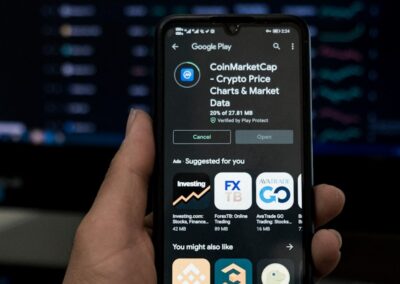Enabling Fractional Ownership through Asset Tokenization
The Rise of Smart Contracts in Asset Tokenization
The use of smart contracts in asset tokenization can enable the fractional ownership and trading of real estate, art, and other valuable assets. This innovative approach is transforming the way assets are managed and traded in regions like Saudi Arabia and the UAE, where technological advancements are rapidly being integrated into the financial and real estate sectors. By leveraging blockchain technology, smart contracts automate and enforce the terms of agreements, providing a secure and transparent mechanism for asset tokenization.
In Saudi Arabia, the integration of smart contracts into asset management aligns with the Vision 2030 initiative, which aims to diversify the economy and promote technological innovation. Real estate developers and financial institutions are exploring the potential of asset tokenization to attract a broader range of investors. By dividing high-value assets into smaller, tradable units, smart contracts facilitate fractional ownership, making it easier for individuals to invest in real estate and other valuable assets.
Similarly, in the UAE, the adoption of smart contracts is gaining momentum. The Dubai Land Department has been proactive in implementing blockchain technology to enhance the efficiency and transparency of real estate transactions. Asset tokenization through smart contracts allows investors to own fractions of high-value properties, democratizing access to prime real estate markets. This approach not only enhances liquidity but also reduces the barriers to entry for investors, fostering a more inclusive investment environment.
Benefits of Smart Contracts in Asset Tokenization
The implementation of smart contracts in asset tokenization offers several significant benefits that are transforming the investment landscape. One of the primary advantages is the increased accessibility to high-value assets. Traditionally, investing in real estate or art required substantial capital, limiting participation to a select few. Smart contracts enable fractional ownership, allowing investors to purchase and trade smaller units of these assets. This democratization of investment opportunities is particularly beneficial in regions like Saudi Arabia and the UAE, where there is a growing appetite for diverse investment options.
Another key benefit is enhanced transparency and security. Smart contracts are executed on blockchain platforms, which provide an immutable and transparent record of transactions. This transparency reduces the risk of fraud and ensures that all parties have access to the same information. Additionally, the automated nature of smart contracts eliminates the need for intermediaries, reducing transaction costs and increasing efficiency. For business executives and entrepreneurs in fast-paced cities like Riyadh and Dubai, these efficiencies can translate into significant cost savings and improved investment outcomes.
Moreover, smart contracts enhance liquidity in traditionally illiquid markets. Real estate and art are valuable assets, but their high cost and complexity often make them difficult to trade. Asset tokenization through smart contracts allows these assets to be divided into smaller, easily tradable units, increasing market liquidity. Investors can buy, sell, and trade these tokens on digital platforms, providing greater flexibility and access to their investments. This increased liquidity is particularly advantageous in dynamic markets like Saudi Arabia and the UAE, where investors seek opportunities to optimize their portfolios.
The Future of Asset Tokenization: Integrating AI and the Metaverse
The future of asset tokenization lies in the integration of smart contracts with other advanced technologies such as artificial intelligence (AI) and the metaverse. AI can enhance the functionality of smart contracts by providing advanced data analytics and predictive insights. For example, AI algorithms can analyze market trends and investor behavior, helping to optimize the terms and execution of smart contracts. This integration can create more dynamic and responsive investment platforms, offering tailored solutions to individual investors.
In the context of Saudi Arabia and the UAE, the convergence of blockchain, AI, and the metaverse is particularly relevant. Both nations are investing heavily in these technologies as part of their broader digital transformation initiatives. The metaverse, with its immersive digital environments, offers new opportunities for asset tokenization. Virtual real estate, art exhibitions, and other digital assets can be tokenized and traded using smart contracts, providing investors with novel investment opportunities. This integration can create a more interconnected and efficient investment ecosystem, driving innovation and economic growth in the region.
For instance, a real estate developer in Riyadh could use the metaverse to showcase virtual tours of tokenized properties, attracting a global pool of investors. AI tools could provide real-time analysis of investor interest and market conditions, optimizing the pricing and terms of the smart contracts. Similarly, an art gallery in Dubai could tokenize digital art pieces, allowing collectors to purchase and trade fractional ownership of these assets. The integration of these technologies can create a more vibrant and accessible investment market, benefiting both investors and asset owners.
Leadership and Management in Implementing Smart Contracts
Effective leadership and management are crucial for the successful implementation of smart contracts in asset tokenization. Leaders in the financial and real estate sectors must be proactive in adopting and integrating these technologies into their business models. This involves not only understanding the technical aspects of blockchain and smart contracts but also fostering a culture of innovation and continuous improvement within their organizations.
In Saudi Arabia and the UAE, regulatory bodies play a pivotal role in supporting the adoption of smart contracts. Leaders in the industry must collaborate closely with these regulatory bodies to ensure compliance and leverage available resources. This collaborative approach can facilitate the smooth integration of smart contracts, ensuring that they are used effectively to tokenize assets and drive investment growth.
Moreover, effective project management is essential for the successful deployment of smart contracts in asset tokenization. This includes careful planning, resource allocation, and risk management. By adopting best practices in project management, businesses can ensure that their smart contract initiatives are executed efficiently and effectively, minimizing risks and maximizing the benefits of blockchain technology for asset tokenization.
Conclusion: Embracing the Future of Asset Tokenization
The use of smart contracts in asset tokenization represents a significant advancement in the investment landscape. In regions like Saudi Arabia and the UAE, where technological innovation is a key priority, the adoption of these blockchain-based tools aligns with broader economic and regulatory goals. By integrating smart contracts with other advanced technologies such as AI and the metaverse, businesses can create a more dynamic and efficient investment ecosystem that meets the challenges of the modern financial landscape.
Effective leadership and management are crucial for the successful implementation of smart contracts in asset tokenization. By fostering a culture of innovation, collaborating with regulatory bodies, and adopting best practices in project management, businesses can harness the full potential of these technologies to enhance their investment offerings. As we move towards a future where digital transactions and virtual investments are the norm, embracing these advancements will be key to achieving business success and driving economic growth in Saudi Arabia and the UAE.
—
#SmartContracts, #AssetTokenization, #FractionalOwnership, #Blockchain, #ArtificialIntelligence, #TheMetaverse, #GenerativeAI, #BusinessSuccess, #LeadershipSkills, #ProjectManagement























